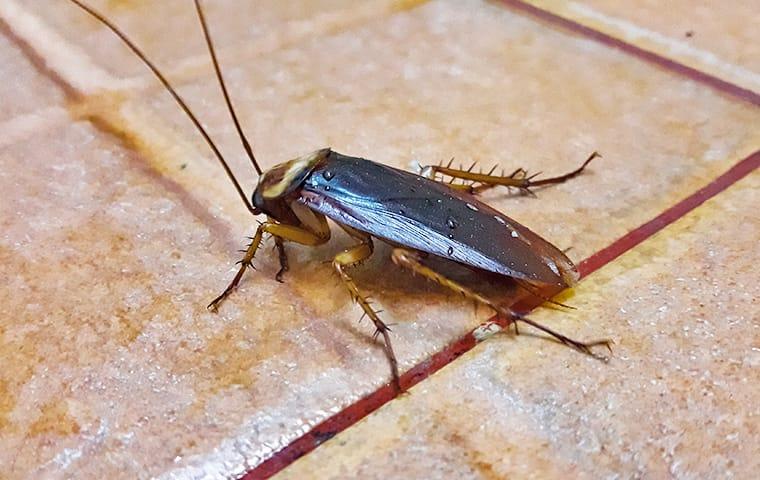Cockroaches are among the most common household pests and are often associated with unhygienic conditions. However, many don’t realize they can also be a serious health concern. Cockroaches can trigger allergies and worsen respiratory conditions, particularly in sensitive individuals. This blog post will explore how cockroaches cause allergies, the symptoms to watch for, and how to effectively address the issue in your home.

How Cockroaches Trigger Allergies
Related: Can pests trigger allergies and asthma?
Cockroaches release allergens that can cause allergic reactions in humans. These allergens come from their saliva, feces, and shed body parts. Over time, these particles mix with household dust and become airborne, making them easy to inhale or come into contact with.
Even small amounts of exposure can lead to an allergic reaction for some people. The immune system identifies the allergens as harmful and reacts aggressively, producing symptoms ranging from mild to severe. Homes with a cockroach infestation are particularly prone to higher allergen levels, increasing the likelihood of allergic reactions.
Who Is Most at Risk?
Certain groups of people are more vulnerable to cockroach-related allergies. These include:
- Children: Young children are more susceptible due to their developing immune systems.
- Asthma sufferers: Individuals with asthma often experience worsened symptoms when exposed to cockroach allergens.
- Elderly individuals: Aging immune systems may not respond effectively, increasing sensitivity.
Symptoms of Cockroach Allergies
The symptoms of a cockroach allergy are similar to those caused by other allergens, such as pollen or dust mites. It’s important to recognize these signs to take timely action.
Respiratory Symptoms
- Persistent sneezing
- Nasal congestion or runny nose
- Coughing or wheezing
- Shortness of breath
- Itchy or irritated throat
Skin Symptoms
- Red, itchy rashes
- Hives or small, raised bumps
- General skin irritation
Severe Reactions
In some cases, cockroach allergens can exacerbate existing conditions like asthma. This can lead to more frequent or intense asthma attacks, requiring immediate medical attention.
How Cockroaches Invade Homes
Cockroaches thrive in warm, damp environments where food and water are easily accessible. This makes kitchens, bathrooms, and basements particularly attractive to them. They can enter homes through tiny cracks, open windows, grocery bags and cardboard boxes.
Different cockroaches, such as German and American, are known for their ability to adapt and reproduce quickly. A small infestation can grow into a major problem quickly, increasing the presence of allergens in your home.
How to Manage Cockroach Allergies
If cockroaches are triggering allergies in your household, you must address the issue on two fronts: managing symptoms and eliminating the source of allergens.
Treat Allergy Symptoms
Consult a healthcare provider if you suspect cockroach allergens are affecting you or your family. They may recommend:
- Antihistamines: To reduce sneezing and nasal congestion.
- Decongestants: To relieve sinus pressure and improve breathing.
- Inhalers or other asthma medications: Those with asthma or severe respiratory reactions.
Over-the-counter medications can help with mild symptoms, but severe cases may require prescription treatments.
Reduce Allergen Exposure
Minimizing exposure to cockroach allergens is critical. Here are some effective steps:
- Clean thoroughly: Wipe down surfaces, vacuum regularly, and clean hard-to-reach areas where cockroach debris may accumulate.
- Seal food properly: Store all food in airtight containers and immediately clean up crumbs or spills.
- Address moisture issues: Repair leaky faucets and pipes to remove water sources.
Improve Indoor Air Quality
Use air purifiers with HEPA filters to remove allergens from the air. Vacuum your home with a vacuum that also has a HEPA filter to trap particles instead of spreading them.
Preventing and Eliminating Cockroach Infestations
Related: What is the most effective cockroach treatment?
The most effective way to reduce cockroach allergens. Preventing an infestation requires vigilance and regular maintenance.
Prevention Tips
- Seal entry points: Close gaps in walls, windows, and doors where cockroaches might enter.
- Dispose of trash promptly: Use tightly sealed bins and remove trash regularly.
- Inspect items brought indoors: Check grocery bags, boxes, and furniture for hidden cockroaches.
Elimination Strategies
If you already have a cockroach infestation, taking immediate action is best. Traps, bait stations, and insecticides can reduce the population, but these methods may not eliminate the problem completely. For effective and long-term results, consider hiring a cockroach exterminator. Professionals have the tools and expertise to address the issue thoroughly, ensuring your home is pest-free.
Maintaining a Pest-Free Home
Related: The Kinds of Health Risks Rodents Bring
Once the cockroaches are gone, keeping your home pest-free is important to avoid future problems. Regular cleaning, proper food storage, and routine inspections can help prevent cockroaches from returning.
Addressing the Hidden Health Risks of Cockroach Allergies
Cockroaches are more than pests—they can pose serious health risks, including triggering allergies. The allergens they produce can cause respiratory and skin issues, making it important to address the problem quickly. You can reduce the chances of cockroach-related allergies in your home by minimizing exposure to allergens, improving air quality, and taking steps to prevent or eliminate cockroach infestations.
Safeguard your home and loved ones from the dangers of cockroach-triggered allergies. Reach out to Valley Integrated Pest Control for professional pest solutions that eliminate infestations and restore safety. Call today and enjoy a cleaner, healthier, pest-free home!





